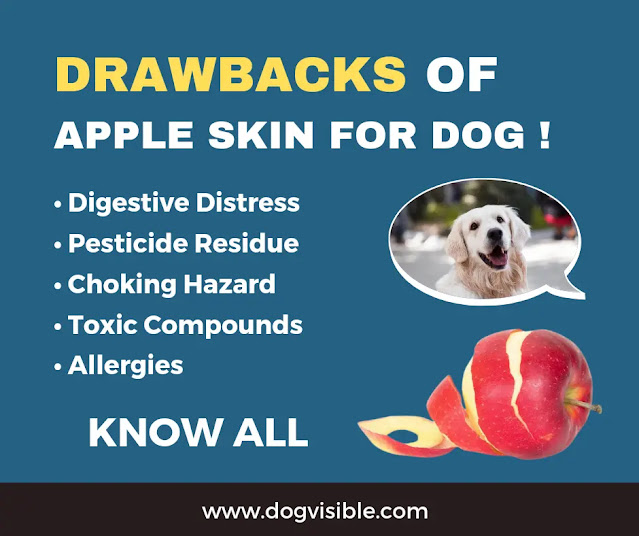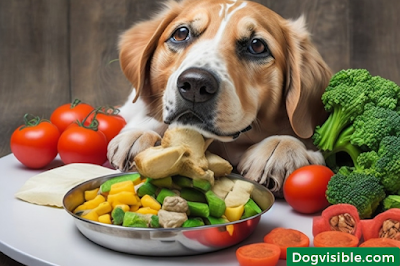Can Dog Eat Apple Skin? Benefits, Risks, and Precautions
The question of "Can dogs eat apple skin?" is a common concern that often crops up in the minds of conscientious pet owners. Apples are a delicious and nutritious treat that many dogs enjoy, but the skin of this popular fruit has garnered mixed opinions in the pet world.
 |
| Continue Reading... |
In this informative exploration, we will delve into Can dogs eat apple skin? The world of canine nutrition to provide you with a comprehensive answer to this question. Not only will you gain insight into whether your four-legged friend can safely indulge in apple peels, but we'll also discuss the potential benefits and precautions to consider.
Join us on this journey to ensure the health and happiness of your beloved pup.
Can Dog Eat Apple Skin?
Yes, dogs can eat apple skin.
Apple skin is safe for most dogs when consumed in moderation. It's a good source of dietary fiber, which can be beneficial for their digestion. However, some dogs may have sensitive stomachs, and the skin can be tough to digest. Therefore, it's essential to monitor your dog when offering apple skin for the first time and ensure it doesn't cause any digestive issues.
Are Apple Skin Safe For Dogs?
Yes, dogs can eat apple skin and safe for dogs, but it should be a small, occasional treat rather than a significant part of their diet.
Because Apple skin contains dietary fiber, which can aid digestion issues or an upset stomach. and promote a healthy bowel movement in dogs. Additionally, it provides essential vitamins and antioxidants, supporting their overall well-being.
Benefits of apple Skin for Dogs !
 |
| Continue Reading... |
1. Fiber Enrichment
Apple skin is packed with dietary fiber, which aids in digestion and can help prevent constipation in dogs. This natural roughage promotes a healthy digestive system.
2. Vitamins and Antioxidants
Apple skin contains various essential vitamins, including vitamin A and vitamin C, along with antioxidants that contribute to overall health. These nutrients can support your dog's immune system.
3. Improved Dental Health
Chewing on apple skin can help remove plaque and food particles from your dog's teeth, leading to better oral hygiene and fresher breath.
4. Hydration
The skin of an apple has a high water content, providing your dog with extra hydration, especially on hot days. This can be particularly beneficial if your pup isn't keen on drinking water.
5. Weight Management
The fiber in apple skin can create a feeling of fullness, which may help manage your dog's weight. It can be a healthy, low-calorie treat alternative.
6. Skin and Coat Health
The vitamins and antioxidants in apple skin can contribute to a shinier coat and healthier skin in dogs.
7. Reduced Risk of Chronic Diseases
The antioxidants in apple skin can help reduce the risk of chronic diseases, such as heart disease and cancer.
8. Nutrient Absorption
The fiber in apple skin not only aids digestion but also supports the absorption of nutrients from other foods your dog consumes.
9. Taste and Enrichment
Dogs often enjoy the taste and texture of apple skin, making it a flavorful and engaging treat that can keep them mentally stimulated.
10. Allergy Management
Some dogs may have food allergies, and apple skin can be a hypoallergenic treat option, as it's less likely to trigger allergies compared to other treats.
Incorporating apple skin into your dog's diet in moderation can offer numerous benefits, but it's important to remember that every dog is unique. Ensure that apple skin is prepared safely, free from seeds and core, and offered as a supplement to your dog's regular balanced diet.
Monitor for any adverse reactions, and always consult your veterinarian before making significant changes to your dog's diet, especially if they have specific dietary requirements or health concerns.
By understanding the advantages of apple skin for your furry friend, you can make informed decisions about incorporating it into their diet.
Can Dog Eat Apple Skin Everyday?
Yes, dogs can eat apple skin in moderation every day.
Apple skin is a nutritious part of the fruit and contains dietary fiber, which can benefit your furry friend's digestion. However, there are a few key points to keep in mind for the health and safety of your dog. Make sure to remove the seeds and core as they contain cyanide, which can be harmful. Also, cut the apple into small, manageable pieces to prevent choking hazards. Lastly, ensure that apple slices are free from any pesticides.
Drawbacks Of Apple Skin for Dogs !
 |
| Continue Reading... |
1. Digestive Distress
Apple skin is tougher to digest compared to the fleshy part of the fruit. For some dogs, it can lead to digestive issues like upset stomach, diarrhea, or constipation.
2. Pesticide Residue
Apples often have pesticide residues on their skin. When dogs consume the skin, they may ingest these harmful chemicals, which can be toxic.
3. Choking Hazard
Apple skin can be a choking hazard, especially for smaller dogs. The tough and fibrous texture of the skin may not break down easily in their digestive system.
4. Toxic Compounds
Apple seeds and apple skin contain a small amount of cyanide, which is toxic to dogs when ingested in larger quantities. While it would take a substantial amount to be harmful, it's still a concern.
5. Allergies
Some dogs may be allergic to apple skin. Consuming it can lead to skin rashes, itching, or other allergic reactions.
6. Caloric Content
The skin of apples contains calories, so if your dog eats a lot of apple skin, it can contribute to weight gain. Obesity can lead to various health issues in dogs.
7. Tooth Damage
The toughness of apple skin can be abrasive on a dog's teeth, potentially causing dental problems over time.
it's advisable to peel the skin and remove the seeds before offering them as a treat. This reduces the risk of digestive problems, toxicity, choking, and allergies. Always consult your veterinarian for specific dietary advice tailored to your dog's individual needs.
What Happens If a Dog Eats a Whole Apple?
If a dog eats a whole apple, the outcome largely depends on the dog's size and the quantity consumed.
In small amounts, apples can be a refreshing and healthy treat for dogs. However, if a dog were to devour multiple whole apples, it could lead to digestive issues such as an upset stomach, diarrhea, or even the risk of choking if the apple is not properly chewed.
Health Conditions Related to Whole Apple Consumption -
- Digestive Upset
- Choking Hazard
- Cyanide Concerns
- Gastric Upset
- Dental Issues
- Overeating Concerns
- Allergies
- Pancreatitis
Final Thoughts
while dogs can enjoy apples in moderation, it's crucial to ensure they don't consume the entire fruit, including the apple skin, core and seeds. Monitoring your dog's apple consumption and removing any potentially harmful parts can help keep them safe and healthy. If you notice any adverse effects or suspect your dog has ingested a substantial amount of apple skin, it's best to consult with your veterinarian for guidance and potential treatment.





